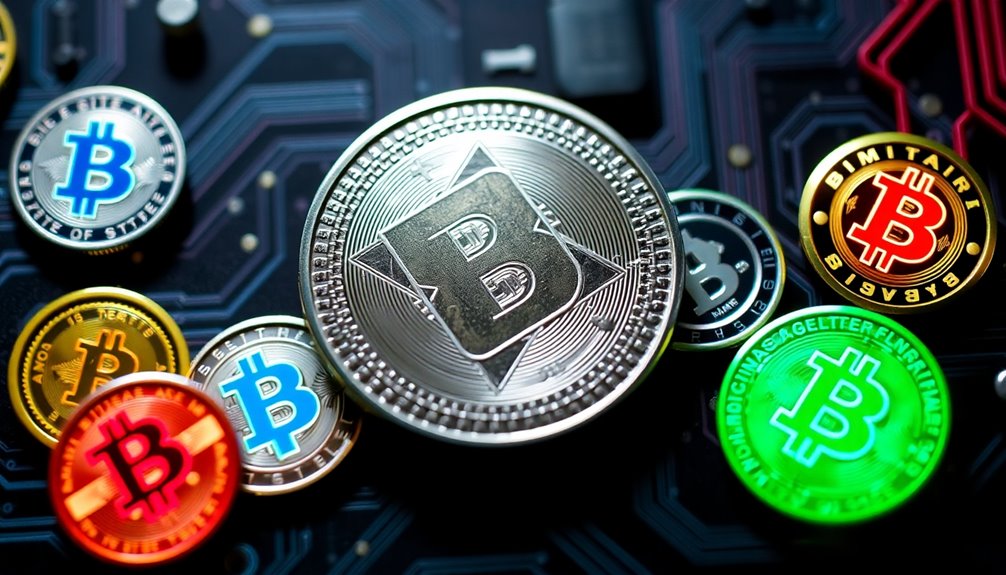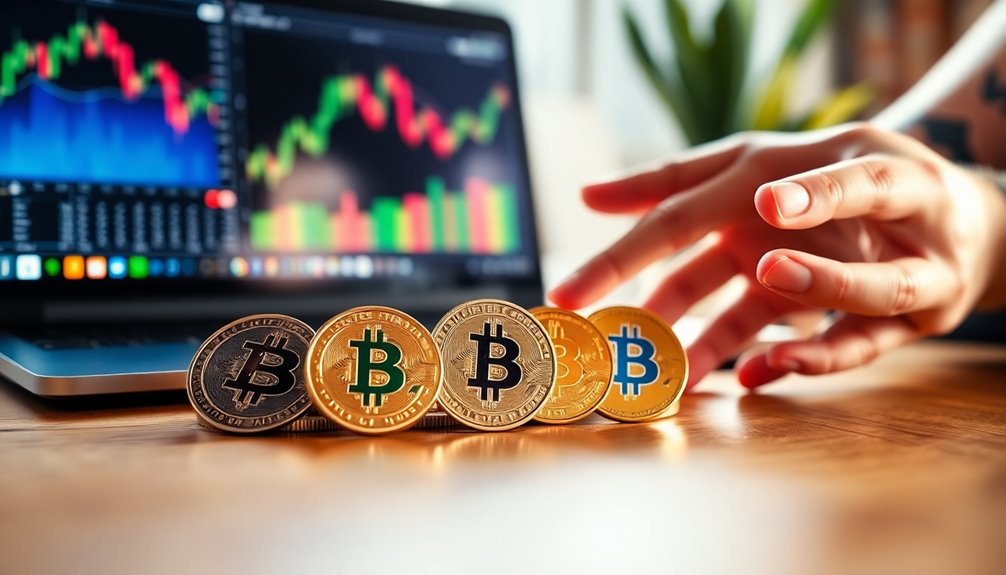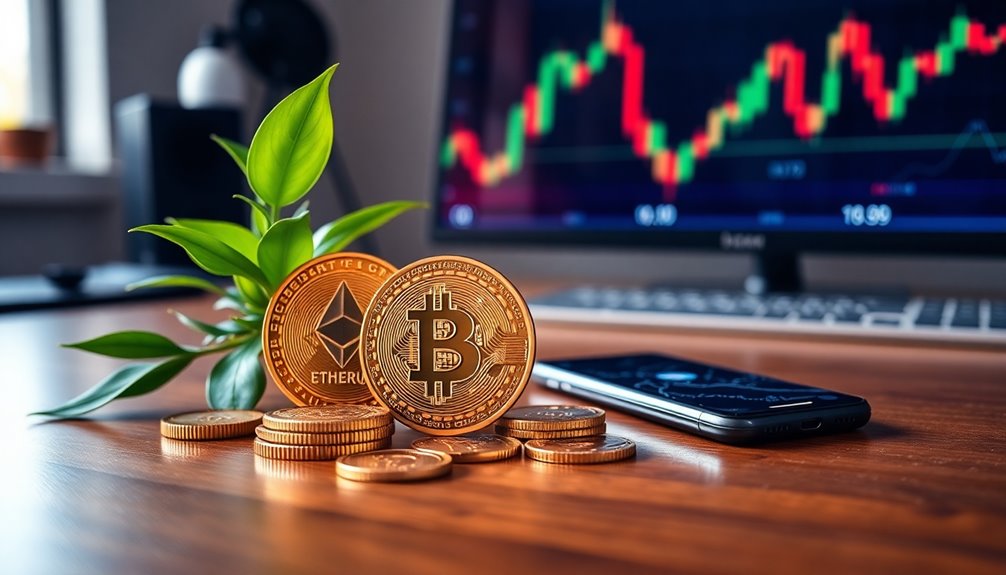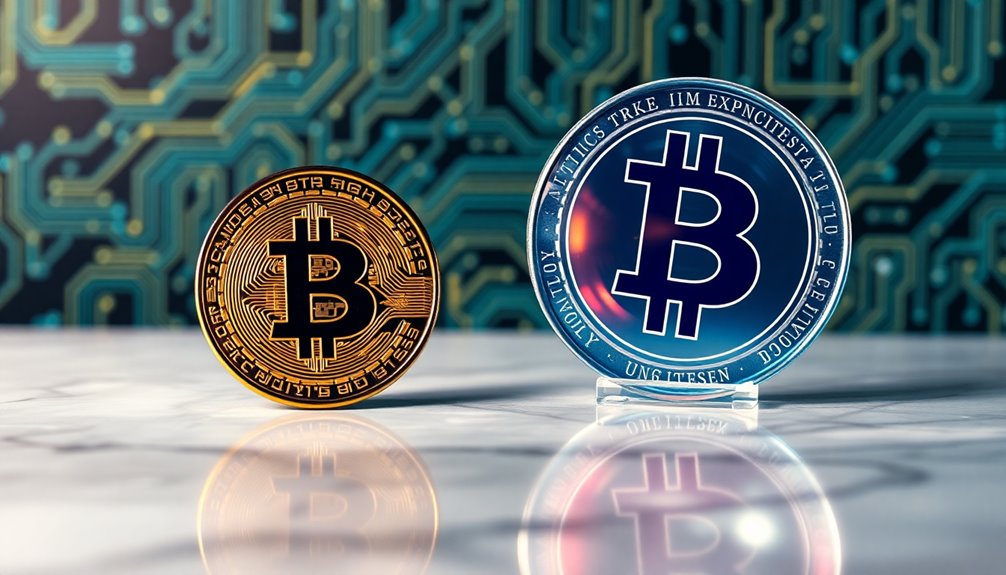There are several types of cryptocurrencies you should know about. Payment cryptocurrencies, like Bitcoin, are designed for transactions. Altcoins, such as Cardano, often improve on Bitcoin's features or introduce new functions. Stablecoins aim to maintain a steady value by pegging to traditional currencies. Coins run on their own blockchains, while tokens exist on established ones, representing various utilities or assets. Understanding these differences can help you choose which digital assets fit your goals. If you're curious about how these types perform in the market, you'll find insightful details that can shape your approach.
Key Takeaways
- Payment cryptocurrencies, like Bitcoin, serve as digital money for transactions and value transfer.
- Altcoins, such as Cardano, offer alternative features or improvements over Bitcoin's design.
- Stablecoins maintain their value by being pegged to traditional assets, reducing volatility.
- Coins operate on their own blockchains, while tokens exist on existing blockchains and represent various utilities.
- Tokens are created through minting via smart contracts and do not require mining.
Crypto Fundamentals Overview

In the world of cryptocurrency, understanding the fundamentals is crucial, especially since these digital assets operate on a decentralized system. This means no central authority controls the network, making it more secure and less prone to failures. Transactions are recorded on a blockchain, a distributed ledger maintained by a network of computers. When you initiate a transaction, it includes your public key, the recipient's public key, and the amount, along with a digital signature. Miners then verify this transaction, ensuring you have the necessary funds and preventing double-spending. Once confirmed, your transaction is added to a block on the blockchain, creating an immutable record. This system promotes transparency and security, crucial for building trust in the cryptocurrency space. Additionally, understanding consensus mechanisms is vital for grasping how transactions are validated and secured within this ecosystem. Security risks associated with online transactions can pose significant challenges for users navigating the cryptocurrency landscape.
Understanding Cryptocurrency Basics

Cryptocurrency represents a groundbreaking shift in how we think about money and transactions. Essentially, it's a digital payment system that operates without a central authority, relying instead on blockchain technology and cryptographic techniques. Unlike traditional currencies, cryptocurrencies aren't backed by physical assets or central banks, which gives them unique characteristics. They offer high privacy and global access, enabling secure and transparent transactions through a decentralized ledger. You'll encounter various types of cryptocurrencies, including payment cryptocurrencies like Bitcoin, alternative coins (altcoins) like Cardano, and stablecoins that aim to maintain a stable value. One important aspect to consider is that cryptocurrencies operate without a central authority, which allows for greater privacy and flexibility in transactions. Keep in mind that mining is essential for creating new units and maintaining the blockchain's integrity. Understanding these basics sets the foundation for navigating the cryptocurrency world.
Blockchain Transaction Process

The blockchain transaction process involves several key steps that ensure secure and transparent transfers of digital assets.
First, you create a transaction in your wallet, specifying the amount and recipient's address. You then sign it with your private key to prove ownership. After checking your balance, the transaction details are reviewed before broadcasting to the network.
Nodes receive it, validate its format, and store it in the mempool. Miners then collect these transactions, solve cryptographic puzzles, and form a new block. This process relies on consensus mechanisms to ensure that all participants agree on the validity of the transactions.
Once a block is mined, it's added to the blockchain, confirming the transactions within. The network agrees on its validity, creating a permanent record, while miners earn transaction fees for their efforts.
Pros and Cons

While exploring the world of cryptocurrency, you'll quickly discover a mix of advantages and disadvantages that shape its appeal.
On the upside, cryptocurrencies offer decentralization, giving you financial autonomy and control over your funds. Transactions are secure, transparent, and often cheaper than traditional banking methods. Moreover, the lower transaction fees associated with cryptocurrencies can significantly enhance profitability for businesses and reduce costs for consumers.
However, the volatility of prices can make investing risky, and the lack of regulation raises concerns about scams and fraud. You might also face security risks, as losing access to your private keys can mean losing your funds forever.
Additionally, limited adoption and complexity might hinder your everyday use. Balancing these pros and cons is essential for making informed decisions in the crypto space.
Token vs. Coin Differences

Understanding the differences between tokens and coins is crucial for navigating the cryptocurrency landscape.
Coins, like Bitcoin or Ethereum, operate on their own blockchains and are typically designed to function as money. In contrast, tokens are digital assets that exist on existing blockchain platforms, such as Ethereum, and can represent ownership, value, or utility.
Tokens are created through a process called minting, utilizing smart contracts, and can serve various purposes, including utility, security, or governance. They don't require mining; instead, they're minted according to predefined rules. The process of token creation involves executing smart contracts that define standards and functionality.
You can store tokens in cryptocurrency wallets and trade them just like coins. Understanding these distinctions helps you make informed decisions in the crypto world.
Market Volatility Concerns

Market volatility in cryptocurrency can feel like a wild rollercoaster ride, with prices swinging dramatically based on news and trader sentiment. Good news can pump up prices, while bad news often triggers a sell-off. Events like government regulation or geopolitical tensions can send shockwaves through the market, affecting values significantly. Additionally, the market's early development stage means prices are still discovering their fair value, leading to heightened volatility. The presence of large holders, or whales, can exacerbate this instability; when they sell, prices can plummet. Limited liquidity in smaller assets further amplifies these swings. Understanding these dynamics is crucial for navigating the unpredictable world of cryptocurrency, especially considering that crypto exhibits stronger and more frequent volatility than traditional assets.
Regulatory Changes Impacting Markets

The unpredictable nature of cryptocurrency prices is often intertwined with regulatory developments across the globe.
In Brazil, the central bank now oversees crypto assets, enforcing rules that target fraud and money laundering, especially following a surge in cryptocurrency imports.
The UK requires companies dealing with digital currencies to secure authorization from the FCA, aiming to enhance consumer protection and prevent money laundering. This regulatory evolution aligns with the international alignment called for by organizations like the World Economic Forum.
Meanwhile, in the US, new bills like the Responsible Financial Innovation Act are pushing for clearer regulations on stablecoins and digital assets, integrating them into existing financial laws.
Across Central and South America, regulations vary wildly, with countries like El Salvador embracing Bitcoin and others, like Colombia, imposing strict bans.
These changes can significantly impact market dynamics.
Research Before Investing

Before diving into the world of cryptocurrency investments, it's crucial to conduct thorough research to mitigate risks and maximize potential rewards.
Start by assessing the development team's expertise and track record—check their past successes or failures.
Delve into the tokenomics by studying the whitepaper to understand its utility and distribution plan. This analysis should include understanding the supply dynamics that affect valuation.
Evaluate partnerships; their credibility can significantly impact the project's growth and market position.
Analyze network metrics like transaction volume and security audits to gauge the network's health.
Lastly, don't overlook the team's commitment through public statements and actions.
Frequently Asked Questions
How Can I Store My Cryptocurrency Safely?
To store your cryptocurrency safely, consider using a hardware wallet or cold storage.
These options keep your private keys offline, significantly reducing the risk of hacking and theft. Always buy hardware wallets from reputable manufacturers and avoid used ones.
Regularly update the firmware to patch vulnerabilities, and securely back up your recovery phrases in a safe place.
What Are the Tax Implications of Cryptocurrency Trading?
Did you know that about 90% of cryptocurrency investors aren't aware of their tax obligations?
When you trade or sell digital assets, you'll trigger taxable events. This includes selling for fiat, trading one crypto for another, or receiving crypto as payment.
Your gains depend on how long you've held your assets. Short-term gains are taxed at ordinary income rates, while long-term gains are taxed at reduced rates.
Always report your income, no matter how small!
Are There Fees Associated With Cryptocurrency Transactions?
Yes, there are fees associated with cryptocurrency transactions.
You'll encounter network fees, often called gas fees, which fluctuate based on network congestion and transaction complexity.
Exchanges typically charge trading fees, structured as maker and taker fees.
Additionally, you might face deposit or withdrawal fees depending on your payment method.
Can I Use Cryptocurrency for Everyday Purchases?
Yes, you can use cryptocurrency for everyday purchases! Many retailers, both online and in-store, accept crypto payments directly.
You can also buy gift cards for various services, including dining and transportation. Apps like BitPay make it easy to manage and pay your monthly bills with crypto too.
Plus, with crypto debit cards, you can shop anywhere that accepts Visa or Mastercard, making your everyday transactions seamless and convenient.
How Do I Choose a Cryptocurrency Wallet?
Choosing a cryptocurrency wallet is like picking the right tool for a job; the right choice makes everything smoother.
You'll want to consider your needs first. If you're just starting, a user-friendly software wallet might be ideal. For stronger security, think about a hardware wallet. If you're handling large amounts, a multi-signature wallet is smart.
Don't forget to check for encryption and support for the currencies you plan to use!
Conclusion
In the ever-evolving world of cryptocurrency, knowledge is your best ally. By grasping the fundamentals and understanding the nuances between tokens and coins, you're better equipped to navigate the market's rollercoaster ride. Remember, research isn't just a step; it's your compass in this financial wilderness. As regulations shift like sand underfoot, staying informed will help you make wise decisions. Embrace the journey, and you might just find your treasure among the digital waves.









